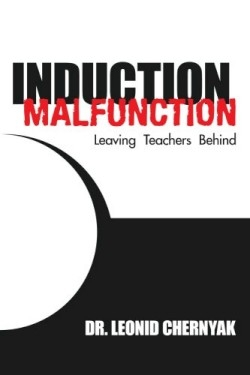Induction Malfunction
Leaving Teachers Behind
With the current climate of education being no less than a firestorm, a study detailing the ways in which schools and administrations fail first year teachers seems not merely relevant, but imperative. Chernyak follows three novice teachers through their first year at a charter school in Florida. While the premise and the circumstances of the story are compelling, the medium is not.
Chernyak, the author of Breaking Routine: A Cosmic Outlook on Our Comic World, earned his Ph.D. in curriculum and instruction and serves as part of the control group he studies, calling himself Novice Teacher A. Unfortunately, including oneself in a study makes objectivity difficult, which may account for Chernyak’s decision to write the story as a piece of social science following the rigors of that discipline in outlining, methodology, purpose, etc., for the first seventy pages of the book. These initial pages rely heavily on quotes and bullet points, an approach that makes reading more challenging than necessary. Because this book is so very relevant, and the likely audience extends well-beyond social scientists, the author would be better served to follow a narrative style similar to that of Mike Rose or Jonathan Kozel, both of whom have written about education with great success using a more qualitative approach.
The narrative approach would remove the difficulty of trying to remain objective, and it would allow readers to engage with the story immediately, rather than wading through lengthy explanations for which they have no context. Secondly, narrative would allow the author/teacher the opportunity to personally reflect on the lengthy email correspondence detailed in the book, as well as offer hands-on suggestions for solving to the problem. All of the front matter of the book could be integrated into the story, thereby making the reading experience more integrated and powerful. Similarly, the final summary currently feels weak. It extends to mere pages but culminates over two hundred pages of events. Were it included in the narrative, it too would have greater resonance.
Chernyak ably recreates conversation and the atmosphere of mistrust, uncertainty, and ignorance that pervaded the school, but the teachers themselves are missing. Readers see actions, not motives. Unlike Howard Gardner’s approach of multiple intelligences, readers are only privy to one approach, and it does not best serve its subject.
Reviewed by
Camille-Yvette Welsch
Disclosure: This article is not an endorsement, but a review. The publisher of this book provided free copies of the book and paid a small fee to have their book reviewed by a professional reviewer. Foreword Reviews and Clarion Reviews make no guarantee that the publisher will receive a positive review. Foreword Magazine, Inc. is disclosing this in accordance with the Federal Trade Commission’s 16 CFR, Part 255.

